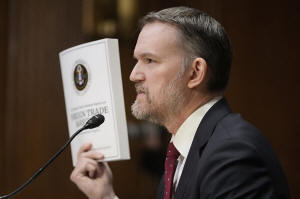Trump's top trade rep under fire before Senate committee after days of
market chaos
[April 09, 2025] By
PAUL WISEMAN
WASHINGTON (AP) — President Donald Trump’s top trade negotiator came
under fire Tuesday from senators unnerved by the president's sweeping
global tariffs, a market meltdown and the heightened risk of recession
from an upended global trading order.
“It seems like we’ve decided to begin a trade war on all fronts,″ said
Republican Sen. Thom Tillis of North Carolina. He said he wanted to know
who in the Trump administration he should hold responsible — and “choke″
— if the tariffs fail and Americans suffer from higher prices and slower
economic growth. “I wish you well,″ he told U.S. Trade Representative
Jamieson Greer. ”But I am skeptical.’’
Greer addressed the Senate Finance Committee a day after global markets
swung wildly and some business leaders lambasted the president's
aggressive bid to raise tariffs on almost every nation on earth.
Greer testified that Trump's tariffs are already getting results,
convincing “about 50'' countries to come to the negotiating table to
reduce their own trade barriers. He said, for example, that Vietnam is
cutting its own tariffs on apples, almonds and cherries. The import
taxes are designed to reduce America's massive trade deficits, but Greer
conceded that it will take time and that the adjustment might ”be
challenging at times.''
Lawmakers, including Republicans, are getting jittery about Trump's
trade wars, especially since stocks collapsed after he announced broad
tariffs last Wednesday. The market rebounded Tuesday on hopes that
negotiations will convince the president to lower or suspend the
tariffs, the biggest of which are set to take effect at midnight
Wednesday.

Several senators demanded that Greer explain what the administration was
seeking to accomplish. At various times, Trump has said the tariffs were
meant to raise money for the Treasury, bring manufacturing back to the
United States, protect domestic industries and get other countries to
make concessions.
“What is the plan?’’ said Sen. Ron Wyden of Oregon, top Democrat on the
finance committee. “In the last week, the White House has been all over
the map when it comes to these tariffs. There is no clear message about
how they were determined, what they’re supposed to accomplish, how long
they will be in place, whether they’re a negotiating tool or a move to
try and cut the United States off from global trade and usher in a new
era of 1870s-style protectionism.’’
Sen. Chuck Grassley, R-Iowa, said he would oppose the tariffs if they
are intended only to raise revenue for the federal government, and not
to open foreign markets to American exports.
[to top of second column] |

U.S. Trade Representative Jamieson Greer testifies before the Senate
Finance Committee on Capitol Hill in Washington, Tuesday, April 8,
2025. (AP Photo/Mark Schiefelbein)
 The Constitution gives Congress
authority to set taxes, including tariffs. But lawmakers have
gradually ceded that authority to the White House.
Trump has been especially aggressive about using the powers of the
presidency to impose his trade agenda. He claimed emergency
authority to impose his massive tariffs last Wednesday. He earlier
used the same powers to hit Chinese, Canadian and Mexican imports.
Trump also has bypassed Congress to tax steel, aluminum and auto
imports on the grounds that they pose a national security threat to
the United States.
Now lawmakers — including some Republicans — are suggesting that
Congress needs to reassert its authority over trade.
“Donald Trump’s aimless, chaotic tariff spree has proven beyond a
doubt that Congress has given far too much of its constitutional
power over international trade to the executive branch,” Wyden said.
"It is time to take that power back.''
Grassley, the Iowa Republican, and Democratic Sen. Maria Cantwell of
Washington last week introduced legislation that would require
presidents to justify new tariffs to Congress. Lawmakers would then
have 60 days to approve the tariffs. Otherwise, they would expire.
Senate Majority Leader John Thune showed no sign that he would allow
a vote on a bipartisan bill that would exert congressional oversight
of Trump’s tariffs.
“I don’t think that has a future,” Thune said of a bill from
Grassley and Cantwell.
_____
AP Writer Lisa Mascaro contributed to this report.
All contents © copyright 2025 Associated Press. All rights reserved
 |